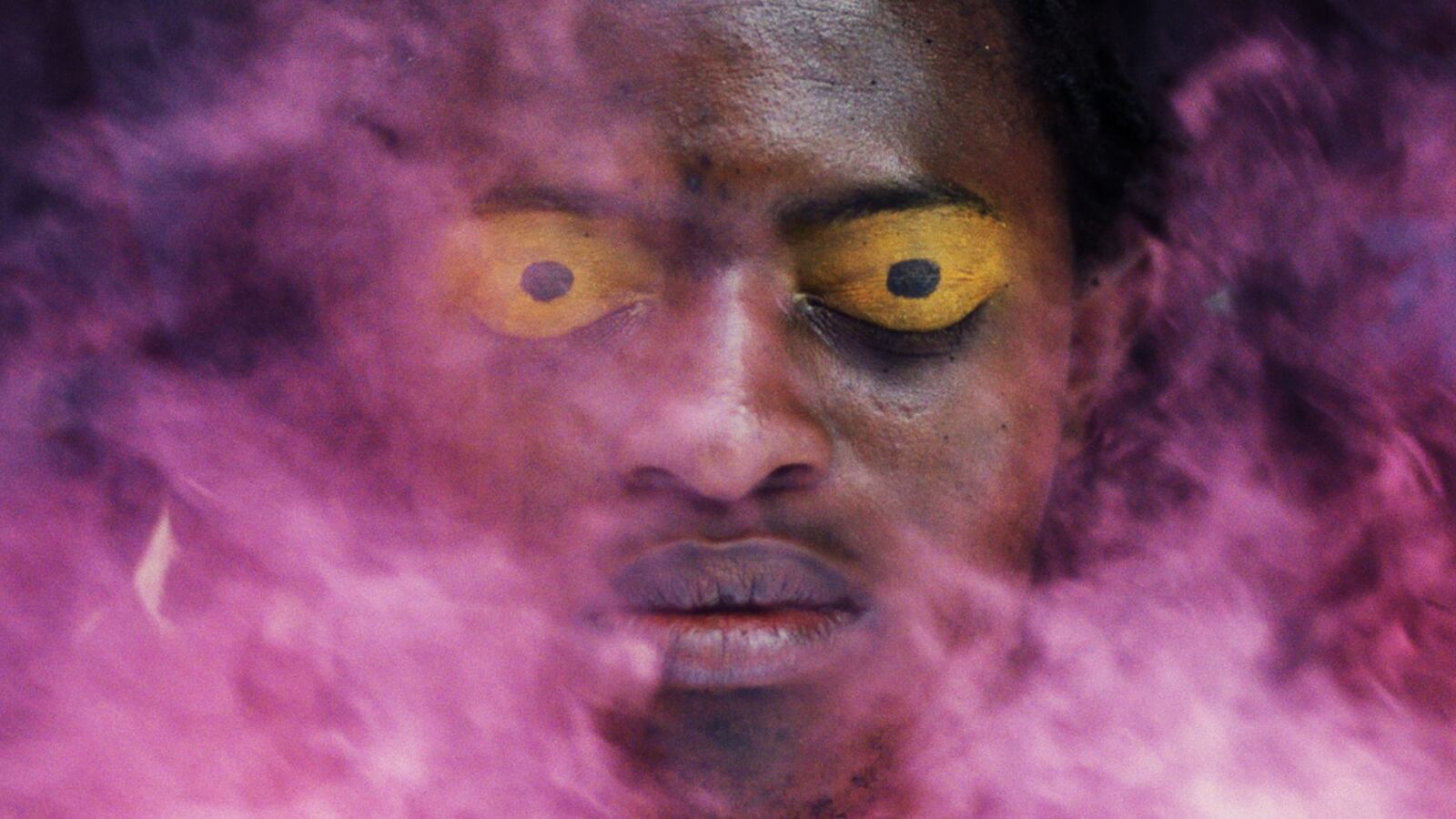Superstitions and the suffering they breed conspire to plague a Congo native who returns to his homeland in Omen, director Baloji’s hauntingly oblique feature debut of terror, trauma, and the ties that bind us to our past and present kin. Embarking upon what seems like a straightforward narrative path before veering into more hallucinatory and ambiguous terrain, this import (which premiered to acclaim at last year’s Cannes Film Festival and will be released in NYC April 12 and in LA April 19) may not always congeal, but it makes up for any narrative patchiness with a bevy of unforgettable images and an attendant sense of ancient beliefs and rituals that divide as much as they unite.
Koffi (Marc Zinga) lives in Europe with his white French fiancée Alice (Lucie Debay), who’s pregnant with twins, and the initial sight of his Afro being shaved down the middle speaks to his divided nature. Though residing in Europe, Koffi is planning to travel back to the Congo to offer a marriage dowry to his parents, who he fears will disapprove of his and Alice’s union on both racial and cultural grounds. Referring to his Afro, Koffi states, “It means something else to them,” but Omen never articulates what that significance might be, which is in keeping with its generally elusive storytelling. When they arrive, Koffi’s sister Tshala (Eliane Umuhire) fails to pick them up at the airport. Unable to contact his father—who works at the local mine—Koffi rents a car and drives through a dusty landscape marked by a biker gang on the side of the road whose leader wears a “Clint Eastwood” hat and silently gives them directions, and a gang of kids who are making a ruckus for their commander.
After cleaning themselves up, Koffi and Alice attend a picnic gathering arranged by his mother Mama Mujila (Yves-Marina Gnahoua), who refuses to speak to him. Everyone else is similarly nasty, be it a man who greets him with “You could have done your hair” or a trio of women whose smiles exude a mixture of condescension and disgust. Because of the birthmark he boasts on his left cheek, Koffi is referred to as Zabolo (“the mark of the Devil”), and when he cradles a young child and has a nosebleed that drips onto the tyke, he’s hysterically decried as a monster who’s trying to curse the baby. Because of this infraction, Koffi is subjected to a tribal ceremony in which a four-faced helmet-like mask is placed over his head and hammered into his skull as punishment for lying to his family, trying to curse a relative, and perpetrating some (unclear) form of betrayal. Later, Alice breaks him out of this head covering, and on their drive away from this locale, she tries to get them on the first flight out of the country.
Before they can definitively decide whether to flee or stay, Omen shifts its attention to a gang of dress-wearing boys known as Goonzs who live in a school bus, earn money as black-market businessmen, and are led by Paco (Marcel Otete Kabeya), who guides them through a boisterous street parade—complete with a band and dancing revelers in all manner of intricate and outlandish masks and costumes—to a public wrestling match overseen by a referee with a giant fan strapped to his back. Director Baloji dramatizes his material with almost no concern for A-to-B plotting, instead demanding that viewers glide along with it as it crests and tumbles in mysterious fashion. On their way through the crowd, Paco and his Goonzs carry a coffin with the name Maya on its lid, and in the ring, they perform a magic trick, sawing one of their own in half, thereby contributing to the material’s fascination with bifurcation.
All of this takes place on and around Easter, and as Koffi searches in vain for his father, who never seems to be at the mine, death, and disconnection become omnipresent. In the aftermath of having his school bus home towed by a rival gang whom he and his mates have to flee, Paco collapses on the ground in convulsions that directly echo an earlier Koffi seizure. Splitting his tale into multiple segments, director Baloji subsequently focuses on Tshala, who hasn’t left the Congo and yet is also somewhat estranged from her mother due to a relationship with a two-timing South African man who, she discovers, has just come down with an STD. To remedy this situation and, additionally, to increase her chances of conceiving a child, Tshala is compelled to employ a local witch doctor who, in one of the proceedings’ most memorable sequences, has them lie on the ground in each other’s arms, their nude bodies covered in palm oil and tribal symbols.
“Here is a different reality,” says Tshala to Koffi and Alice. That’s apparent throughout Omen, whose action is driven by forces and dynamics—the pain of parenthood and separation; the onerous obligations of family and culture; the divisive corrosiveness of religious fantasies—that are persistently felt if rarely discussed. In their own ways, Koffi and Tshala are burdened by the customs and practices of their clan and culture, and as it expands its purview further to concentrate on Mama Mujila, the film transforms into a wide-ranging portrait of the shackles of yesterday. At times, the material’s indifference to clearly explicating the links between its various interests can be a tad frustrating, leaving one adrift in a dreamy sea of symbols and signifiers. Nonetheless, Baloji’s visuals are so striking—from an introductory tornado column of sand creeping along the desert horizon, to a closing trek through a field of burning scarecrows—that he conjures an enchanting mood of conflict, alienation and sorrow.
In a similar (and superior) vein as Nikyatu Jusu’s Nanny, Omen trades in myth and folklore not for traditional horror but, rather, for a chilling atmosphere of sinister spirits and deadly inheritances. The struggle to reckon with personal and national histories, and to hold loved ones close and to let them go, is an arduous undertaking in Baloji’s film, if ultimately a mesmerizing one.






